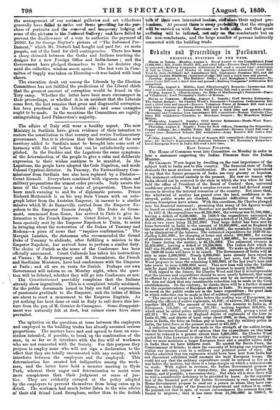The affairs of Italy still wear a healthy aspect. The
new Ministry in Sardinia have given evidence of their intention to restore the constitution to that country and revive Parliamentary government. But it is obvious that the institutions of the new territory added to Sardinia must be brought into some sort of harmony with the old before that can be satisfactorily accom- plished. In the Duchies and the Legations the same symptoms of the determination of the people to give a calm and deliberate expression to their wishes continue to be manifest. In the legations, the people have adopted the Code Napoleon, and made Colonel Cypriani dictator. In Tuscany, the Extraordinary Com- missioner from Sardinia has also been replaced by a Dictator— Count Rioasoli. Everywhere combined with vigorous action and military preparations the utmost order prevails. Italy awaits the issue of the Conference in a state of preparation. There has been much running to and fro of diplomatic persons. Prince Richard Metternich is on his way from Vienna with an auto- graph letter from the Austrian Emperor, in answer to a similar missive which M. de Banneville carried from the Emperor Na- poleon to the Emperor Francis Joseph. The Duke de Gram- mont, summoned from Rome, has arrived in Paris to give in- formation to the French Emperor. Count Reiset, it is said, has been specially sent by the Emperor Napoleon to Turin, to assist in bringing about the restoration of the Dukes of Tuscany and Modena—a piece of news that "requires confirmation." The Marquis Laiatico, the statesman who recommended the Grand Duke of Tuscany to abdicate, after fulfilling a mission to the Emperor Napoleon, has arrived here to perform a similar duty. The choice of Zurich as the scene of the Conference has been officially announced. Count Colloredo has taken his instructions at Vienna ; M. de Bourqueney and M. Desambrois, the French and Sardinian Ministers, have had conferences with the Emperor at Paris ; and all are en route for Zurich. Perhaps our own Government will inform us on Monday night, when the ques- tion will be debated, whether they will go into Conference or not.
The Constitutionnei peevishly complains that the Italians already show ingratitude. This is a complaint totally mistimed, for the public documents issued in Italy are full of expressions of passionate gratitude to the Emperor, and the ladies of Milan are about to erect a monument to the Empress Eugenie. As yet nothing has been done or said in Italy to call down this lec- ture from the pen of M. Granier de Cassagnac. Some disappoint- ment was naturally felt at first, but calmer views have since prevailed.


























 Previous page
Previous page